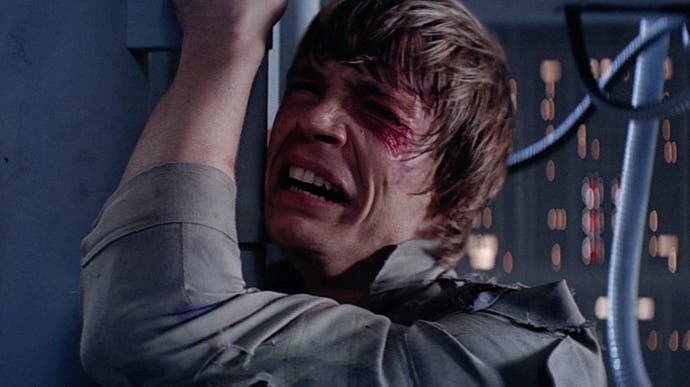What if we could shuffle plot twists each time we played?
"No, actually I'm not your father."
I love a good plot twist. I will always remember the moment in Star Wars: Knights of the Old Republic when I found out who my character really was, and always remember the moment in BioShock when I found out who the real baddie was. These things make a game, they sear it into our memories.
But once you know the secret what then? The game is done more or less. You might get a bit of mileage from playing again and spotting the clues, but there are no real surprises left to be had, not unless you're Nier Automata but let's not go there now. But what if a story could change? What if it was fundamentally different a second time around?
I got to thinking about this recently after talking to a man called Ray Winninger, the head of Dungeons & Dragons, tabletop side. He's only recently been appointed that position after spending many years away from Wizards of the Coast, but he's been involved with and playing D&D most of his life. He professionally wrote campaigns as a teenager and even played with the game's creators, Dave Arneson and Gary Gygax. Dungeons & Dragons is in his bones.
It was while talking to him about everything D&D (Chaotic Good is by far and away the most popular alignment by the way) he said something which made my ears prick up. He was telling me about how to be a great Dungeon Master, something he's been for decades, and said the secret to it was, appropriately enough, having a Deck of Secrets. Every time you create something, come up with a secret about it, he explained. A new dungeon: give it a secret. A new character: give them a secret. Then note it down and add it to your deck.
Secrets can be big and they can be, well, massive. Winninger told me about one where his players spent literal years puzzling over a huge canyon in the world, only to discover it was made by the moon. The moon hadn't crashed into the planet but created a chasm when it floated off into orbit. It had once been part of the world. How? It was born there. The planet was its mother. The planet was alive. It took his group three years to figure that out. Imagine the moment they did - it's not a moment I would forget.
He shared other examples of secrets in a column he wrote about 20 years ago for a D&D magazine called Dragon, which is thankfully still archived online. They're only samples of secrets, templates if you will, because it's hard to give anything else without specific settings, but they're enough to fire the imagination nonetheless.
My favourite is a secret about a long and successful rule of a line of monarchs. Turns out it has nothing to do with the people themselves, the kings and queens, but the sword they inherit and wield. "Unknown to everyone," Winninger wrote, "[the] sword has been secretly governing the affairs of state since the foundation of the kingdom many generations ago." Maybe it even embodies the soul of the first ruler, one reluctant to ever give power away.
Or how about the idea of revealing, a good chunk of the way through the game, that the gods everyone prays to are dead and have been for a long time? What do the pious clerics and paladins do then? Or what if players were to discover history was repeating itself every X number of years almost down to a tee? Events, exact numbers of casualties, even assassinations: all the same. What could players do with the knowledge once they figured it out?
Players can be the subject of these secrets too, just as in Knights of the Old Republic. Perhaps you spring on one of your players that they have a murderous background they couldn't remember for some reason, or that they're - surprise! - related to an important character in the game. "No, I am your father. Hhhh. Hhhh."
Winninger's mind is a treasure trove. It's actually quite thrilling flicking through his various secrets without having to go through games first. It feels a bit naughty, like cheating. And it all builds an impression of Winninger sitting there like some Dungeon Master guru at the table with an exaggeratedly large and magical Deck of Secrets beside him, ready at any moment to pull a card and upend the game in delight and surprise.
What if a video game could do this? What if a video game had a Deck of Secrets and could shuffle the key moments of your adventure each time you play? What if next time you meet a different character early on who takes you on a different journey to a different outcome? What if the entire objective of the story changes next time you play? We've got games that mix up levels and enemies, why can't we throw in stories as well?
Wouldn't that be fun?



